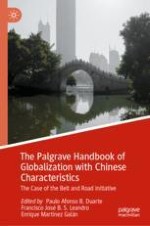2023 | OriginalPaper | Buchkapitel
32. Sino-Iranian Cooperation in Artificial Intelligence: A Potential Countering Against the US Hegemony
verfasst von : Mohammad Eslami, Nasim Sadat Mosavi, Muhammed Can
Erschienen in: The Palgrave Handbook of Globalization with Chinese Characteristics
Verlag: Springer Nature Singapore
Aktivieren Sie unsere intelligente Suche, um passende Fachinhalte oder Patente zu finden.
Wählen Sie Textabschnitte aus um mit Künstlicher Intelligenz passenden Patente zu finden. powered by
Markieren Sie Textabschnitte, um KI-gestützt weitere passende Inhalte zu finden. powered by
